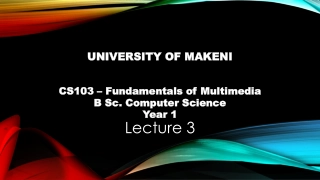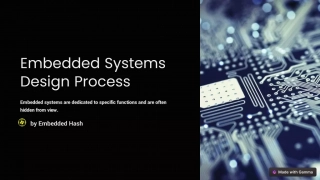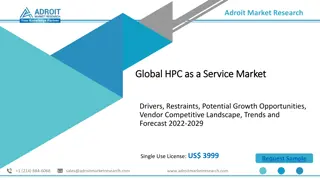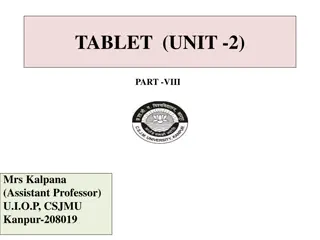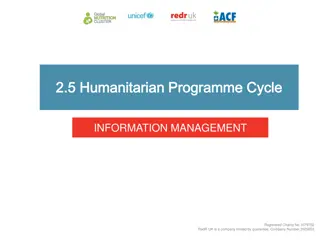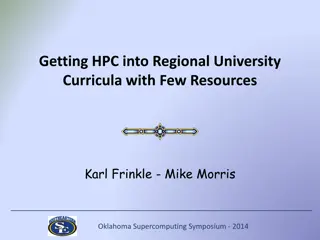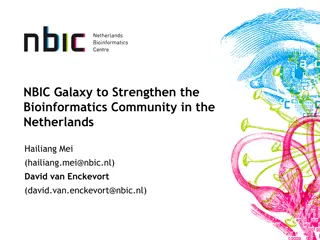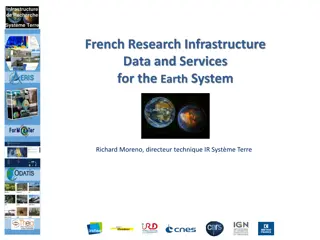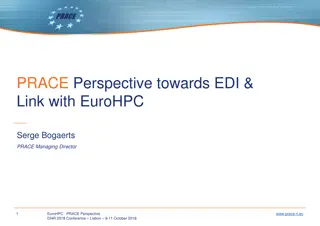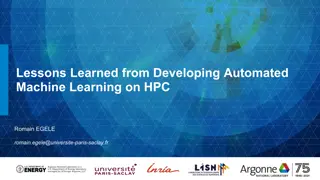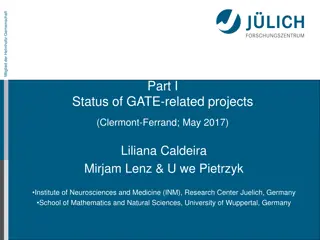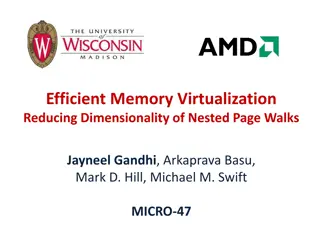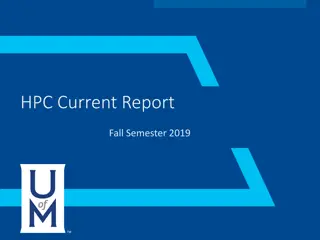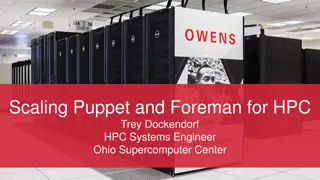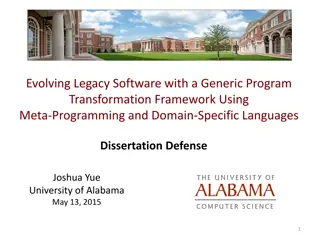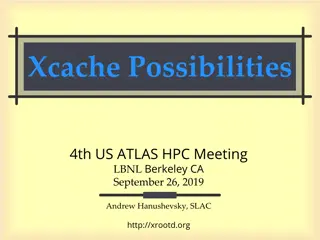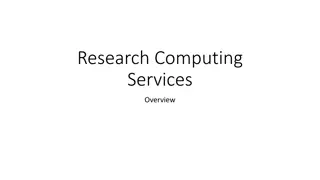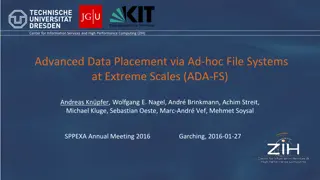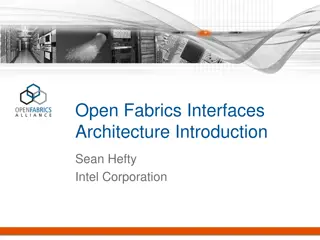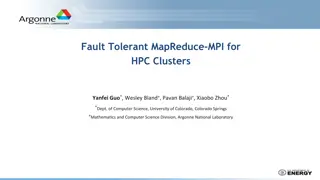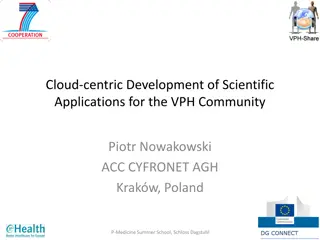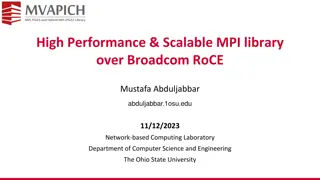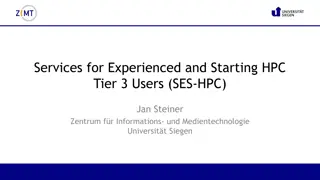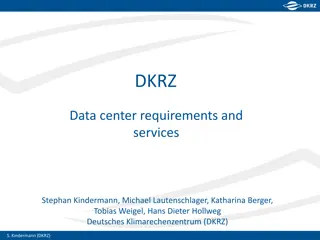Understanding Multimedia Systems: Hardware and Software Components
Multimedia systems require specific hardware and software components to meet the demands of producing and playing multimedia content. Development systems are used for creating content with higher specifications, while playback systems are used for playing multimedia files with lower specifications.
8 views • 46 slides
Embedded Systems Design Process in the Embedded systems
Embedded systems are all around us, from the tiny microcontrollers in our household appliances to the sophisticated control systems in cars and aeroplanes. But how are these systems designed? Let's delve into the basics of the embedded systems design process in simple terms that anyone can understan
2 views • 9 slides
Empowering SMEs and AI Communities for Growth and Scalability
Enabling SMEs and AI communities to harness the power of High-Performance Computing (HPC) for growth and scalability through insightful sessions, panels with diverse perspectives, and highlighting key enablers and initiatives in the field. The session structure includes user perspectives, enabler pr
1 views • 14 slides
Overview of Distributed Systems: Characteristics, Classification, Computation, Communication, and Fault Models
Characterizing Distributed Systems: Multiple autonomous computers with CPUs, memory, storage, and I/O paths, interconnected geographically, shared state, global invariants. Classifying Distributed Systems: Based on synchrony, communication medium, fault models like crash and Byzantine failures. Comp
9 views • 126 slides
Understanding Information Systems in Organizational Management
Management in organizations is divided into three levels: operational, tactical, and strategic. Each level requires different information systems to support various activities. Operational systems focus on routine transactions and control processes, while middle-level systems aid in semi-structured
9 views • 39 slides
Challenges in Implementing Evidence-Based Equity Programs
Equity and diversity initiatives in HPC and scientific computing face obstacles such as the "Yes, Minister" fallacy, ineffective mandatory trainings, pitfalls of gender equity committees, and survivorship bias. Dr. Emily Kahl from The University of Queensland highlights the need to avoid policy anti
2 views • 10 slides
HPC as a Service Market Share, Related Trend, Growth Opportunity & Competitive
The most recent Global HPC as a Service Market\u00a0Report 2022\u20132029 from Adroit Market Research offers a thorough analysis of the opportunities, challenges, and trends in this ever-changing industry.
0 views • 5 slides
Understanding Different Types of Recommender Systems
Recommender systems play a crucial role in providing personalized recommendations to users. This article delves into various types of recommender systems including Collaborative Filtering, Content-Based, Knowledge-Based, and Group Recommender Systems. Collaborative Filtering involves making predicti
0 views • 7 slides
Introduction to Embedded Systems Design
Embedded Systems Design, Chapter 1 provides an insightful overview of embedded systems, distinguishing them from general-purpose computers. The chapter delves into the characteristics of embedded systems, their design considerations, and the various types of embedded computers such as general-purpos
1 views • 7 slides
Understanding Film Forming Agents for Tablet Coating in Pharmaceuticals
Film forming agents play a crucial role in tablet coating, providing mechanical strength and desired film characteristics. Non-enteric film formers like HPMC, MHEC, EC, HPC, Povidone, SCMC, and PG Acrylate Polymers are commonly used for uniform film formation. Each agent has unique properties and pr
1 views • 10 slides
Introducing MatFlow: Open-source Python Tool for Computational Materials Science
MatFlow is an open-source Python code designed for computational materials science, running on HPC systems like CSF at Manchester. Users specify tasks to run in a workflow, with the main output being a workflow HDF5 file. The tool aims to make reproducibility and transparency easier, connect dispara
2 views • 10 slides
Understanding the Humanitarian Programme Cycle (HPC)
The Humanitarian Programme Cycle (HPC) is a coordinated series of actions aimed at preparing for, managing, and delivering humanitarian responses efficiently. It focuses on delivering fast, coordinated, effective, and protection-driven aid to those affected by crises. Central to the HPC is the invol
2 views • 8 slides
Implementing HPC in Regional University Curricula with Limited Resources
Addressing the challenge of integrating High-Performance Computing (HPC) into regional university curricula with limited resources. The presentation outlines goals, essential courses, hardware and software requirements, and approval processes involved. Strategies like utilizing LittleFe clusters and
0 views • 38 slides
Exploring Distributed Solvers for Scalable Computing in UG
This project discusses the use of distributed solvers in UG to enable multi-rank MPI-based solvers with varying sizes, addressing the need for scalable solver codes and dynamic resource allocation. It introduces the UG solver interface, revisits the Concorde solver for TSP problems, and explores run
0 views • 14 slides
Strengthening the Bioinformatics Community in the Netherlands
NBIC Galaxy, in collaboration with BioAssist, plays a pivotal role in bolstering the bioinformatics community in the Netherlands. With a focus on training, collaboration, and sharing tools, Galaxy enables scientists to leverage national HPC infrastructures for analysis, further enhancing research ca
0 views • 17 slides
Information Systems in Organizations: Overview and Implementation
Information systems play a crucial role in organizations, encompassing transaction processing systems, functional area information systems, and enterprise resource planning systems. This content delves into the purpose of transaction processing systems, the support provided by information systems ac
0 views • 30 slides
Research Infrastructure for Earth System: Development and Status
The French Research Infrastructure for the Earth System, managed by Richard Moreno, focuses on data and services development. Plans include working groups, meetings, and key activities like data modeling and ontology development. The status of Data and Services Hubs is highlighted, showcasing collab
0 views • 20 slides
PRACE's Role in Advancing HPC Ecosystem and EuroHPC Integration
PRACE, through its proven recipe and achievements, actively contributes to the High-Performance Computing (HPC) ecosystem in the EU. It provides access to Tier-0 systems, supports scientific projects, offers training programs, and facilitates R&D access for industrial users. With a focus on excellen
0 views • 13 slides
Lessons Learned from Developing Automated Machine Learning on HPC
This presentation by Romain EGELE explores various aspects of developing automated machine learning on High-Performance Computing (HPC) systems. Topics covered include multi-fidelity optimization, hyperparameters, model evaluation methods, learning curve extrapolation, and more valuable insights for
0 views • 12 slides
Overview of Task Computing in Parallel and Distributed Systems
Task computing in parallel and distributed systems involves organizing applications into a collection of tasks that can be executed in a remote environment. Tasks are individual units of code that produce output files and may require input files for execution. Middleware operations coordinate task e
0 views • 17 slides
Improvements and Performance Analysis of GATE Simulation on HPC Cluster
This report covers the status of GATE-related projects presented in May 2017 by Liliana Caldeira, Mirjam Lenz, and U. we Pietrzyk at the Helmholtz-Gemeinschaft. It focuses on running GATE on a high-performance computing (HPC) cluster, particularly on the JURECA supercomputer at the Juelich Supercomp
0 views • 8 slides
Enhancing Gender Equality in Humanitarian Action
The Gender Reference Group (GRG) conducted a review in 2015 of the IASC's Gender Policy Statement, highlighting inconsistent implementation and lack of gender capacity. As the GRG Chair, UN Women will lead the revision of the 2008 Gender Policy to establish an accountability framework. This update a
0 views • 5 slides
Validation of Replacement Method for Clinical CD34+ Cell Purification
Urgent validation of a replacement method for clinical CD34+ cell purification is required due to the discontinuation of COBE 2991 and CliniMACS I in 2023. Options include using CliniMACS II with an alternative cell washer or the Miltenyi Prodigy system. An optimized thaw method may allow for the re
0 views • 12 slides
Efficient Memory Virtualization: Reducing Dimensionality of Nested Page Walks
TLB misses in virtual machines can lead to high overheads with hardware-virtualized MMU. This paper proposes segmentation techniques to bypass paging and optimize memory virtualization, achieving near-native performance or better. Overheads of virtualizing memory are analyzed, highlighting the impac
0 views • 48 slides
Overview of Fall Semester 2019 HPC Current Report
The Fall Semester 2019 HPC Current Report highlights changes made in resource allocation, job queue management, utilization analysis, and factors influencing job priority. Key modifications include adjusting memory per CPU, implementing limit enforcement, and changing fairshare weights. The report d
0 views • 20 slides
Scaling Puppet and Foreman for HPC by Trey Dockendorf
Introduction to Puppet configuration management and Hiera YAML data for Foreman provisioning in an HPC environment, emphasizing the motivation and requirements for scaling provisioning and management in large HPC centers using Foreman's host life cycle management, key-value storage, NFS root provisi
0 views • 16 slides
Evolving Legacy Software with Program Transformation Framework
Dissertation defense by Joshua Yue on evolving legacy software using meta-programming and Domain-Specific Languages. Focus on High Performance Computing (HPC), challenges of parallel programming, and implementing utility functions. Research objectives include facilitating software development and ma
0 views • 63 slides
Xcache Possibilities and Effective Use in HPC Environments
Xcache, a versatile caching system, offers various possibilities for data transfer, remote access, data streaming, and HPC optimization. The system enables efficient data reuse and provides enhanced data integrity and accessibility features. Explore the potential applications and considerations for
0 views • 7 slides
Understanding Embedded Systems and Cyber-Physical Systems
Embedded systems are specialized computer systems embedded within larger systems, such as control systems and car controllers. This lecture covers real-time aspects, applications of Cyber-Physical Systems (CPS), and examples like the Boeing 777/Airbus A380 cockpit. It discusses the design process of
0 views • 22 slides
Research Computing Services Overview and Support Summary
Research Computing Services at the institution provide a range of support including staff listings, needs survey development, peer institution comparisons, faculty surveys, and areas of support like consultation, data, HPC, and digital humanities. The team is involved in survey initiation, review, a
0 views • 11 slides
Updates from TSVV3 Regular Advancement Meeting on 22/09/2021
TSVV3 regular advancement meeting held on 22/09/2021 covered various topics including project news, format of regular meetings, code progress monitoring, availability of Gitlab on Gateway, reporting for HPC and SB, and the latest publications. The meeting emphasized the importance of professionaliza
0 views • 9 slides
Improving Extreme Scale Data Placement for High Performance Computing
Explore the challenges faced by I/O subsystems in HPC machines at Exascale, and the proposed solution of using an Ad-hoc overlay file system for optimizing I/O performance. The research aims to enhance data placement through transparent solutions for parallel applications by leveraging additional st
0 views • 15 slides
Evolution of OpenFabrics Interfaces Architecture
Evolution of OpenFabrics Interfaces Architecture aims to align software interfaces with application requirements in the realm of high-performance computing (HPC). With a focus on supporting multiple interface semantics, remaining fabric and vendor agnostic, and adaptable in upstream Linux, the initi
0 views • 42 slides
Exploring Bringing Your Own Capacity in High-Throughput Computing
Researchers are increasingly interested in accessing compute capacity outside of their usual systems in high-throughput computing. This exploration delves into the history, phases, and initial experiments of bringing external capacity to the Open Science Pool, detailing the process and challenges fa
0 views • 18 slides
Fault-Tolerant MapReduce-MPI for HPC Clusters: Enhancing Fault Tolerance in High-Performance Computing
This research discusses the design and implementation of FT-MRMPI for HPC clusters, focusing on fault tolerance and reliability in MapReduce applications. It addresses challenges, presents the fault tolerance model, and highlights the differences in fault tolerance between MapReduce and MPI. The stu
1 views • 25 slides
Cloud-Centric Development of Scientific Applications for VPH Community
A cloud platform designed for the VPH community to efficiently manage cloud/HPC resources, provide easy access and support for application developers and end users. Features include easy installation of scientific applications, secure data management, and flexible deployment options for computationa
0 views • 17 slides
Enhancing HPC Performance with Broadcom RoCE MPI Library
This project focuses on optimizing MPI communication operations using Broadcom RoCE technology for high-performance computing applications. It discusses the benefits of RoCE for HPC, the goal of highly optimized MPI for Broadcom RoCEv2, and the overview of the MVAPICH2 Project, a high-performance op
0 views • 27 slides
Services for Experienced and Starting HPC Tier 3 Users (SES-HPC) Overview
Discover the SES-HPC initiative at the Jan Steiner Zentrum für Informations- und Medientechnologie, University of Siegen. This project aims to support both seasoned and novice users in navigating High-Performance Computing environments. From motivation to infrastructure details and pillars of suppo
0 views • 23 slides
Development of EIRENE-NGM for Neutral Gas Dynamics in Fusion Reactors
EIRENE-NGM project focuses on enhancing the neutral gas dynamics model for fusion reactor simulations, including efficient HPC utilization, physics basis refinement, database improvement, interface development, and predictive capability validation. Collaborators from various institutes aim to create
0 views • 17 slides
DKRZ Data Center Overview: Services and Infrastructure Updates
DKRZ is updating its data infrastructure hosting environment to enhance services like data life cycle management, quality assurance, and CMIP6 support. The data center is undergoing migration to integrate HPC and data systems, establishing a national MIP data analysis cache and cloud. Long-term arch
0 views • 13 slides
